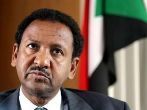Sudan’s FM optimistic about striking peace deal within months
SEOUL, Sept 13 (AFP) — Sudan’s foreign minister said Monday he was optimistic about striking a peace deal within three months to end atrocities in Darfur and again rejected US charges of genocide in the region.
 Foreign Minister Mustafa Osman Ismail, on a visit to South Korea, said his government and rebel groups would “very soon” resume the African Union-brokered peace talks.
Foreign Minister Mustafa Osman Ismail, on a visit to South Korea, said his government and rebel groups would “very soon” resume the African Union-brokered peace talks.
“Hopefully, before the end of this year, we will sign a final peace agreement,” he told a news conference in Seoul.
“Hopefully, by next year the whole of Sudan will be in peace.”
In the Nigerian capital of Abuja on Sunday, rebel negotiators also said they remained hopeful about peace talks as AU special envoy General Abdusalami Abubakar of Nigeria was helping bridge the gap.
Such optimism came after the US charges of genocide in the Darfur region, where an estimated 50,000 people have been killed and 1.4 million more uprooted since February 2003. The claim is flatly denied by the Sudanese government.
The Sudanese government has been accused of arming and backing Arab militias known as Janjaweed, which have rampaged through the country’s western Darfur region.
In a statement released in Seoul, the Sudanese government said no UN organizations, including the office of the High Commissioner for Human Rights, had described the situation in Darfur as genocide.
“Therefore it is not for the United States to unilaterally label the situation in Darfur as genocide,” the statement read.
The United States is pushing for another UN Security Council resolution including the threat of sanctions on Sudan’s oil industry if Khartoum does not disarm and stop the militias.
“There is explicitly no genocide in Sudan,” said the Sudanese foreign minister, who denounced the US accusations as a pr-election political ploy by President George W. Bush.
The minister said the US-led resolution would fail to win backing from the UN Security Council.
“It will be very difficult for the United States to impose sanctions on Sudan because it is unrealistic, not balanced and not rational,” he said.
The 15-member council emerged divided last week after the United States formally presented the draft resolution to the United Nations.
Washington has solid support from Germany and Britain and needs nine votes for passage if no permanent council member decides to veto it. Russia, Pakistan, Algeria and China have expressed unhappiness with the draft.
